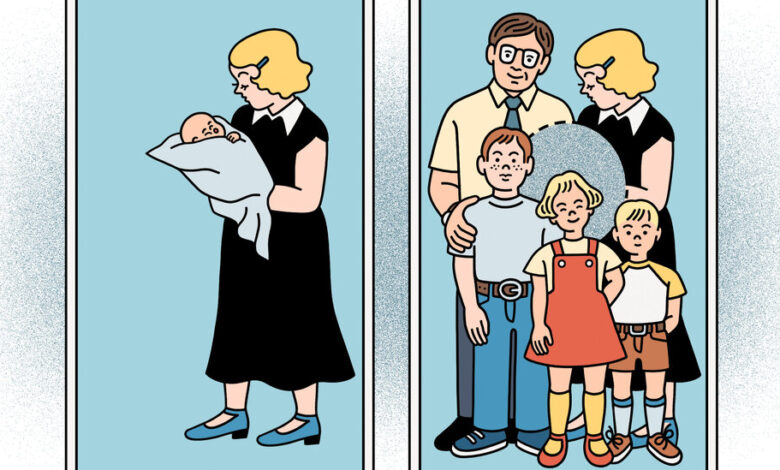My Birth Father and Siblings Don’t Know I Exist. Should I Contact Them?

When I was born, 55 years ago, my birth mother decided to deliver me to Catholic Charities so that I could be adopted. I was lucky to be raised by loving and caring people who never hid my adoptive status from me. They made it a routine part of my story — much like having blue eyes or being lactose intolerant. It was part of who I am while still being essentially a mystery: I do not know my family medical history nor what time of day I was born nor (until recently) what genetic relatives I might have.
Many years later, things have changed. I obtained a legal copy of my birth certificate with my birth mother’s name. A DNA test turned up a close relative. Conversations with the relative revealed that my birth mother was — and is — deeply ashamed of my birth, given her religious beliefs. Her husband, who is very likely my birth father, has no idea that I exist. Nor do three genetic siblings.
The relative has spoken of me to my birth mother, and I have been asked to refrain from any further contact with my genetic family; my birth mother never thought I would be able to learn who she was, let alone find any other genetic kin. The fact that I am a gay man also shames her and conflicts with her deeply held religious beliefs. That she placed a son for adoption and that this son is gay are things she wouldn’t want anyone to learn, I’ve been informed.
In short, I am torn. I worry about making a selfish decision. If I accede to her wishes, my birth siblings and my father will be denied the chance to decide whether they want to engage with me in any way. I would not push my presence on them, but I feel, in some ways, that they should be able to make the choice to have me as a part (however small or large) of their lives.
If I do not accede to her wishes, it feels like a violation of whatever agreement she entered into when she made what was likely a heart-wrenching decision in the late 1960s, a period in which we thought differently as a society about many things.
Is contacting my genetic siblings just a selfish, self-justifying unethical act? Or does my silence amount to complicity in keeping information from family members who might want to know? Name Withheld
Shame is the feeling that you’ve done something that makes you unworthy of respect or, worse, worthy of contempt. But when we conceal things out of shame, that act of concealment may, over time, grow into a far larger source of shame. Your birth mother hid your existence from the people she knows, it would seem, because you were conceived out of wedlock. If what you were told is true, then what she’s determined to keep secret from her husband isn’t that she had premarital sex — they did this together, after all — but that she somehow had their first child without telling him.
Keeping from your husband the fact that you had a child with someone else before you married is a big problem, and yet one that a spouse could probably adjust to. But hiding from your husband the fact that you had a child together? That’s of a different order. It means that there’s a very substantial lie at the heart of their relationship. It’s hard to measure the sense of bewilderment and betrayal that her husband and her other children would feel. Is this something you can really come back from?
All this assumes, of course, that the family situation is what you think it is. Without going into details, I’ll say that there are certain DNA results connecting you to one of the couple’s genetic descendants that could make it highly probable. The stakes would be less if learning about you simply meant that her children learned that their mother — who is, it would seem, devoutly Catholic — had premarital sex. (If she would also feel ashamed that the son she placed for adoption is gay? Well, that’s her problem. The Catholic Catechism teaches that gay people “be accepted with respect, compassion and sensitivity.” So her faith is no excuse.) But the truth that your existence represents would be far more destructive, owing to her profound misjudgment in keeping this secret from her husband, your birth father.
Right now, you have an informant among your genetic kinfolk, someone whose reports you plainly consider trustworthy. This person has spoken to your birth mother and is conveying her position and perspective. So you’ve already learned that your mother doesn’t want a relationship with you — doesn’t want to confront the reality of what she did. I can tell you that you are within your rights to open the door to a relationship with your genetic siblings and father. But I can’t assure you that, all things considered, it’s the right thing to do.
If your genetic homecoming devastates a marriage and a family, the blame will have been hers but the choice will have been yours. Talking to her, by contrast, won’t result in irreversible damage, however painful she finds it; she, like the close relative you’ve been in touch with, already knows the story. Even if she doesn’t reconsider her stance, you may be able to learn more from her about your other relatives. You could gain some understanding about why she made the decisions that she made. In the end, you may decide to let this woman, who’s perhaps in her mid-70s, continue with the life she built for herself over the decades. There’s a heavy burden, certainly, in being the one to shatter this life. Sparing her, you could be sparing yourself, too.
I was born out of wedlock and given up for adoption at birth. My adoptive parents were unhappily divorced when I was a toddler, and they both believed that it wasn’t necessary for me to know about my birth parents. After years of research, I now know my story. My parents were in their teens: my father a visiting university student from Iraq; my mother an American who had just graduated from high school. (At birth I was labeled “mixed race.”) My birth parents are both still alive, though elderly, and both have families who probably know nothing of this episode of their lives.
I would like to meet them, talk to them, see them, say hello to them. I’ve had a happy and successful life and am not looking for anything from them, like money or an ongoing parental relationship. But it would mean everything to me to meet/see/hug someone to whom I was actually related by blood. I also understand, however, that they may not wish to revisit this long-ago moment in their lives. I’m curious if you have a perspective here. Name Withheld
When parents have a child whom they are not prepared to raise, they have the right to place that child for adoption. But they don’t have the right not to be approached by that child as a grown-up. Even if the parents were promised confidentiality at the time of the adoption, that promise isn’t one the child was a party to.
And you’re seeking only to contact them, not to reveal their secret to others. This situation, in short, is utterly remote from the one that I’ve discussed earlier in this column. Will your birth parents be distressed if you contact them? They may be; or they may be curious, even excited. Any potential negative consequences here would seem to be manageable — and more than offset by the prospect of what could be a valuable relationship for you and for them.
Kwame Anthony Appiah teaches philosophy at N.Y.U. His books include “Cosmopolitanism,” “The Honor Code” and “The Lies That Bind: Rethinking Identity.” To submit a query: Send an email to [email protected]; or send mail to The Ethicist, The New York Times Magazine, 620 Eighth Avenue, New York, N.Y. 10018. (Include a daytime phone number.)





